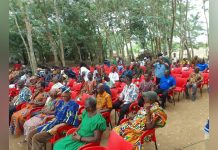
Africa-Press – Ghana. SINGAPORE — On Monday (Dec 27), co-chair of the national Covid-19 task force, Mr Lawrence Wong, said that Singapore would now deal with Omicron cases the same way it does for the Delta variant given early international evidence showing that Omicron is more transmissible but causes less severe illness than Delta.
This means that those infected with the Omicron strain can isolate at home while border restrictions will be lifted for countries such as Botswana, Ghana and South Africa where the strain has spread widely, said the Ministry of Health in a press release on Sunday.It was a turnaround from a month ago when the Omicron variant had only just emerged and the authorities imposed stricter border controls and isolated those confirmed or suspected to be infected with the variant at the National Centre for Infectious Diseases to keep Omicron cases under control in Singapore.
TODAY looks at how the Omicron strain differs from Delta, and whether Singapore’s latest approach towards Omicron cases means that the country can stay the course for re-opening.
HOW DIFFERENT IS OMICRON FROM DELTA?
Infectious diseases experts that TODAY approached said that the Omicron variant is significantly more transmissible than Delta.Dr Ling Li Min, a senior consultant at Rophi Clinic, said that Omicron cases double every two to four days, shorter than the time taken for the Delta variant to double.
ADVERTISEMENTShe cited a study by the United Kingdom’s Health Security Agency which showed that the Omicron strain is 3.2 times as likely as the Delta variant to transmit within a household.
However, preliminary studies have suggested that the Omicron variant causes less severe infection compared to the Delta strain.
Early research by scientists from the University of Edinburgh, for instance, found that those infected with Omicron were almost 60 per cent less likely to be hospitalised than people infected with Delta.
However, Dr Duane Gubler of the Duke-NUS Medical School said that current infections could appear to be less severe in patients because of the protection afforded by vaccines and prior Covid-19 infections in patients. He added that further studies are needed to assess the severity of Omicron.
Similarly, Dr Ling said that it is still early days as incidence of severe illness usually occurs only weeks later.In a Facebook post on Monday, Mr Wong, who is also the Finance Minister, said that vaccines and boosters remain “a key strategy” against Omicron.
Associate Professor Ashley St John of the Duke-NUS Medical School said that there is a “strong indication” from other countries that vaccination is highly effective in preventing severe diseases caused by all known Covid-19 variants.
To limit vaccine breakthrough cases caused by Omicron, Assoc Prof St John said that booster jabs should be encouraged as they are known to further reduce the likelihood of severe infections and its symptoms.
Dr Francis Collins, the director of the National Institutes of Health, the US’ public health research agency, noted in a Dec 14 blog post that there appears to be a “significant decline” in neutralising antibodies against the Omicron strain in people who have received two doses of an mRNA vaccine as compared to its protection against the original variant.
ADVERTISEMENT“However, initial results of studies conducted both in the lab and in the real world show that people who get a booster shot, or third dose of vaccine, may be better protected,” he added
For More News And Analysis About Ghana Follow Africa-Press






